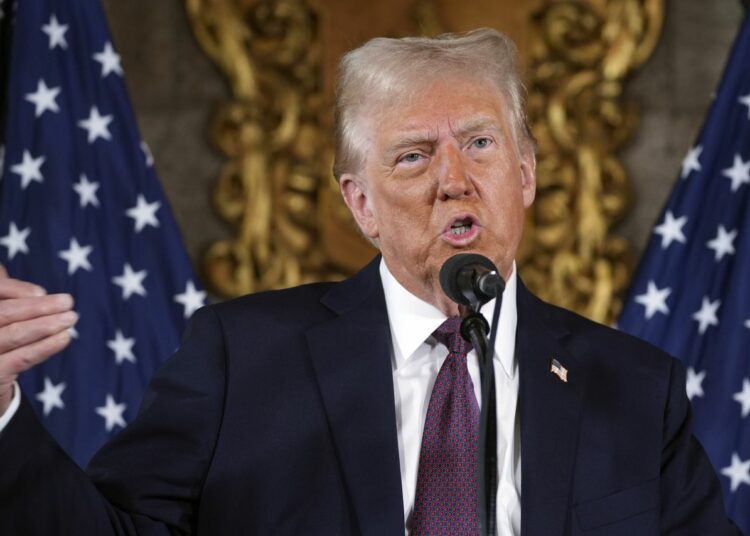I have read the statements issued by the United States President, Donald J. Trump, in which he expressed grave concern over the plight of Christians in Nigeria. In his first post on 31 October 2025, he declared that “Christianity is facing an existential threat in Nigeria. Thousands of Christians are being killed. Radical Islamists are responsible for this mass slaughter. I am hereby making Nigeria a ‘Country of Particular Concern.’” Barely a day later, on 1 November 2025, he followed with another message warning that “If the Nigerian Government continues to allow the killing of Christians, the U.S.A. will immediately stop all aid and assistance to Nigeria, and may very well go into that now disgraced country, ‘guns-a-blazing,’ to completely wipe out the Islamic Terrorists who are committing these horrible atrocities.”
I have no doubt in my mind that what has escalated the situation and drawn so much attention from the international community is the recent senseless killings at Yelewata in Guma Local Government Area of Benue State.
As a Christian from Benue State, I regard the killings as the height of the Fulani herdsmen militia banditry that has plagued our state for far too long. Today in Benue, vast areas, particularly Guma and parts of Makurdi Local Government, as well as large portions of Gwer-West and sections of Gwer-East Local Government, remain deeply affected by recurring disturbances and brutal attacks carried out by armed Fulani herdsmen militias. The whole of the Agatu area of the state, as well as parts of Apa, Ado, and sections of Ogbadigbo, are also severely affected. The food basket of the state, the Sankera axis, which includes Ukum, Shitile, and Logo, has become a complete no-go area. For years, farmers there have been displaced, their lands overrun, and they have been left idle without any form of productive activity. The once-vibrant agricultural economy that sustained countless families has been crippled, leaving despair and hunger in its wake.
As if the herdsmen menace were not enough, the situation in Kwande Local Government Area presents an even more distressing picture. The area has been ransacked not only by Fulani herdsmen militias but also by illegal miners, whose unchecked activities have devastated farmlands, polluted water sources, and further displaced rural communities. What began as isolated incursions has now evolved into a dual assault, one driven by violence, the other by greed. Together, they have left Kwande’s once-thriving agrarian economy in ruins and deepened the sense of lawlessness spreading across Benue State.
It is, therefore, a matter of great concern that nothing significant has been done by government, both at the state and national levels, to stem this crisis that has persisted for many years. The silence and inaction have emboldened the perpetrators and deepened the suffering of innocent citizens. However, beyond the tragedy in Benue, I wish to examine President Trump’s statement as it affects the entire Nigerian landscape. The theatre of violent operations involving Muslim or Islamic extremists is largely situated in Borno and Yobe States, with pockets of insurgent activity in parts of Gombe. In addition, widespread kidnappings and banditry have taken hold across Sokoto, Zamfara, Katsina, Niger, Plateau, Kwara, Kaduna, and even Ondo States, painting a grim picture of insecurity that transcends religion or region.
It would be interesting to know the actual population distribution of Muslims and Christians in these affected areas. There is no doubt that whether Muslims or Christians are the victims in this long-drawn and, to many of us, senseless conflict, the fact that it has not been stopped or decisively addressed is simply unacceptable.
I would, however, like to return to my home state, Benue, and examine what has happened there, as this appears to be the straw that broke the camel’s back and drew the attention of the international community to the crisis. It is also necessary to assess the actions of the state government, especially Governor Hyacinth Alia, who is the chief security authority in charge of protecting lives and property, who receives substantial security votes from the federation account for precisely that purpose.
During the tenure of Governor Samuel Ortom, the government devoted much of its effort to confronting the Fulani herdsmen militia who persistently attacked local farmers. Although that administration did not completely end the crisis, it succeeded in reducing the scale of bloodshed that has now become a daily occurrence. The enactment of the Anti-Open Grazing Law, designed to prohibit open grazing in Benue, and the engagement of local guards to enforce compliance, restored a measure of stability and encouraged farmers to return to their lands.
However, for the past two years since Governor Hyacinth Alia assumed office, this law has been effectively suspended, and many of the proactive measures previously adopted have been abandoned. The governor has often appeared to sympathize more with the herdsmen than with the victims, sometimes portraying our people as the aggressors. When the Yelewata attack occurred, it took him several hours, if not days, to respond. He initially downplayed the scale of the carnage and even described the massacre as mere “skirmishes.”
Here are some of the reported statements and impressions of Governor Alia regarding the Benue Crisis between March – June 2025:
In March 2025, following an attack in Katsina-Ala Local Government Area that claimed at least eleven lives, Governor Hyacinth Alia issued a statement condemning the killings. While his words expressed sympathy, they offered no concrete measures to forestall further violence. Many citizens described his response as perfunctory and reactive, the kind of rhetoric that comes after tragedy rather than leadership that prevents it.
By April 17 2025, new waves of violence had swept through Otukpo, Ado, and Logo Local Government Areas. Reacting to these incidents, Governor Alia remarked that, “They come and kill any person irrespective of ethnicity … they return a few weeks later and come in full-fledged for occupation. This is land grabbing.” With this statement, he shifted the framing of the conflict from a herder–farmer crisis to a land-grabbing agenda. While the argument drew attention to the economic motive behind the violence, critics observed that it downplayed the role of the Fulani herdsmen militias who have long been the direct perpetrators.
Two days later, on April 19 2025, the governor appealed for calm, urging communities not to take up arms in retaliation. “Don’t resort to self-help … the state government is developing a strategic plan to end the killings,” he said. Security analysts welcomed the call for restraint, but local communities — frustrated by repeated attacks and unfulfilled promises, felt abandoned. For them, patience had become a luxury in the face of persistent slaughter.
On April 21 2025, as the scale of attacks widened, Governor Alia gave a dramatic assessment of the situation, declaring that “we are under siege as a state; we are under attack … it is targeted, it is planned, and religiously, it is being executed.” His words painted a grim picture of a state overwhelmed by violence. While his candour was appreciated, many interpreted the statement as an admission of helplessness and a confession of the government’s loss of control.
Just days later, between April 23 and 24 2025, the governor altered his description of the attackers, claiming they were no longer the familiar herdsmen but foreign militants. “They don’t look like us Nigerians … they don’t speak what we understand … it’s just to kill, maim, drive people out of their land and then to occupy,” he declared. The statement was sharply criticized for being unverified and potentially divisive. Many saw it as an attempt to externalize the problem and shift responsibility from domestic security failings to vague external forces.
In May 2025, controversy deepened when Governor Alia publicly stated that there were “no longer herders’ attacks” in Benue State. The comment provoked outrage across the state, prompting former Governor Samuel Ortom to demand an apology, describing the statement as “insensitive and misleading” at a time when rural communities were still being attacked and buried their dead almost weekly.
The violence intensified in June 2025, when fifty-nine people were killed in Yelewata, near the Benue–Nasarawa border. Governor Alia confirmed the massacre and announced plans to cooperate with the Nasarawa State Government to share intelligence. While the acknowledgement was welcome, critics again noted the absence of specific preventive measures or clear accountability for the security lapses that allowed such an attack to occur.
Later that same month, the governor escalated his description of the crisis, saying, “It is beyond just an ethnic fight between herders and farmers … it is terrorism … a directed, calibrated plan.” Though his language underscored the severity of the situation, observers pointed out that no corresponding policy shift or security mobilization followed his words.
By the end of June 2025, Governor Alia made one of his most controversial statements, alleging that certain members of the National Assembly from Benue were “the architects … harbouring these people … and buying all the gadgets for them.” The claim, made without evidence, provoked a sharp reaction from legislators, who described it as “baseless, reckless, and irresponsible.” Rather than uniting stakeholders against a common threat, the allegation further strained relations between the executive and legislative arms of government, casting doubt on the governor’s judgement in handling a crisis of such magnitude.
President Trump’s sweeping remarks about the killing of Christians in Nigeria struck a chord globally, but they also exposed the vacuum of credible local leadership in addressing the crisis. While Trump’s tone was provocative, it at least forced the world to look toward Benue. By contrast, Governor Alia’s inconsistent statements have confused the public, alienated victims, and weakened the moral authority of his office.
In effect, Trump spoke in anger from afar; Alia spoke carelessly from within. The former’s outburst may have been diplomatically irresponsible, but the latter’s conduct represents a deeper failure, the failure of empathy and governance. Words have consequences, and when those entrusted with power trivialize tragedy or deflect blame, they compound the wounds of their people.
The crisis in Benue and across Nigeria has reached a point where rhetoric must give way to responsibility. What the nation requires now is not blame or political grandstanding but decisive, coordinated action rooted in justice and compassion. The Federal Government must rise above partisan politics and treat the ongoing killings as a national emergency deserving the same urgency as any external threat. The Benue State Government, for its part, must restore the Anti-Open Grazing Law, rebuild community defence structures, and demonstrate genuine empathy toward victims rather than resort to denial or blame-shifting.
Nigeria cannot afford leaders who speak lightly in the face of bloodshed or wait for foreign voices to remind us of our moral duty. The world is watching, but more importantly, the people of Benue are bleeding. Leadership must begin at home, with truth, courage, and a renewed commitment to protect every Nigerian life.
~ Shango, a Veteran Journalist and public intellectual, writes from Abuja.





